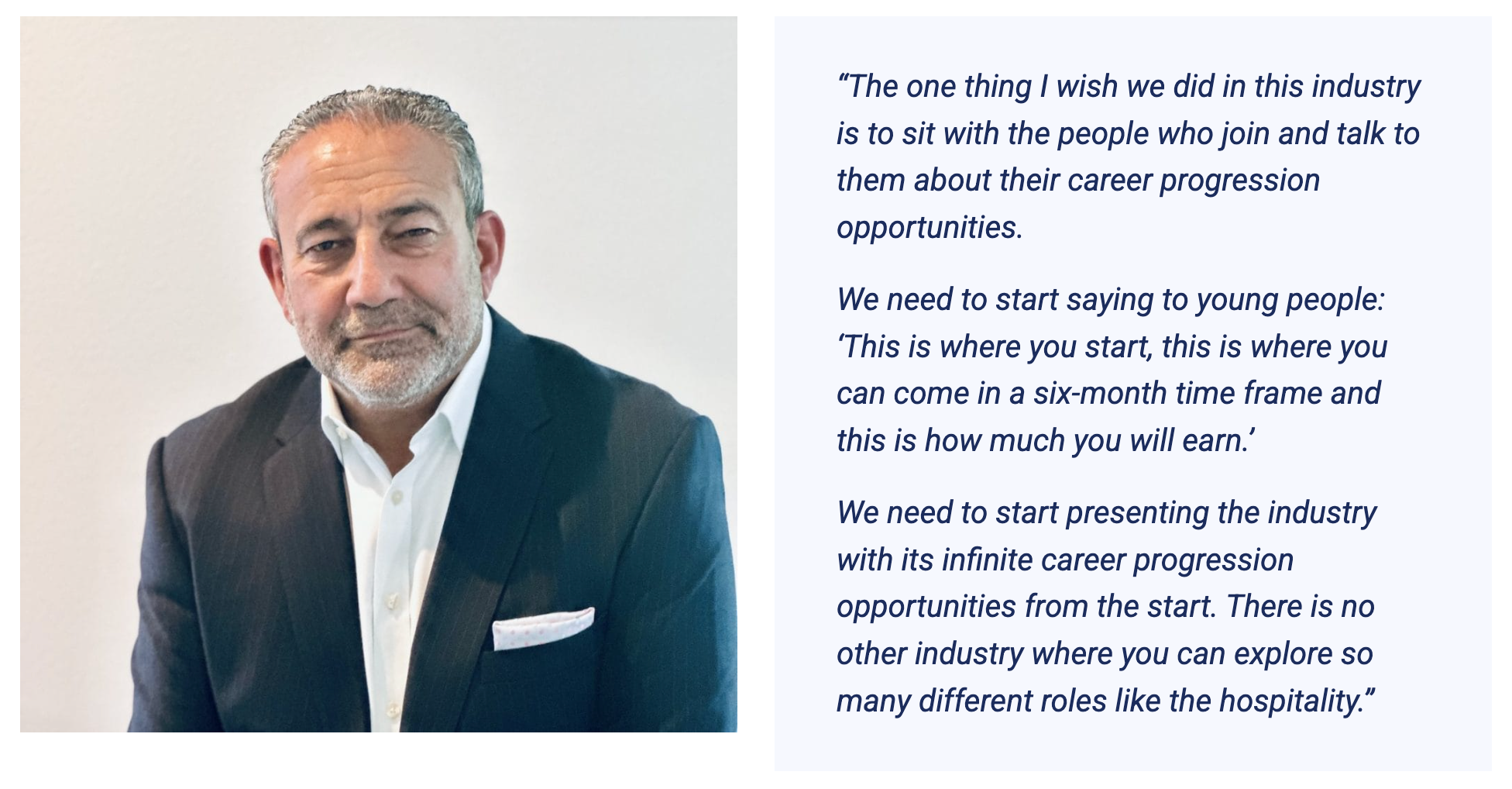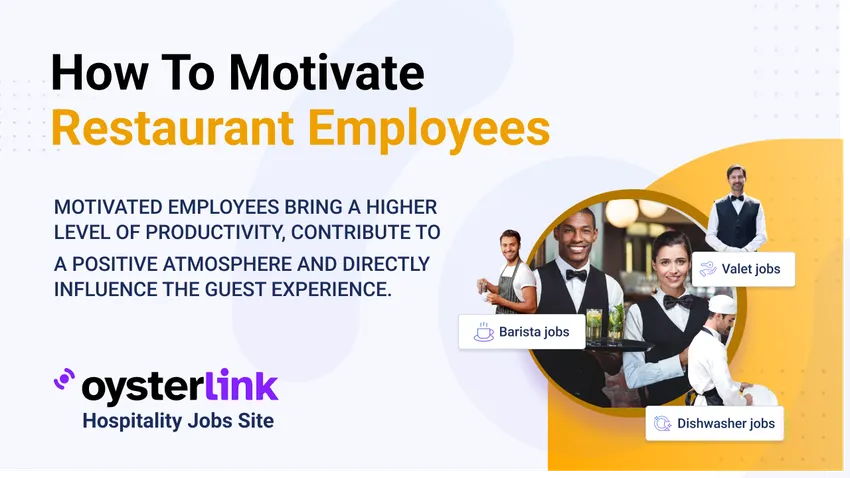When you think about what makes a restaurant thrive, the focus often falls on the food and ambiance.
But at the heart of it all are the people who work there.
Their motivation can really make a difference — not just for the vibe in the restaurant, but also for the overall guest experience and your bottom line.
In this guide, we’ll explore practical strategies on how to motivate restaurant employees.
The Importance of Employee Motivation in Restaurants
Motivation is key to building a productive, efficient team in any industry — but in restaurants, it’s absolutely essential.
Restaurants are lively, quick-moving environments where every second counts.
Motivated employees bring a higher level of productivity, contribute to a positive atmosphere and directly influence the guest experience.
When employees feel valued and engaged, they’re more likely to stay, reducing turnover rates and creating a more stable, cohesive team.
One effective approach for understanding what drives individual team members is based on the Human Motivation Theory developed by psychologist David McClelland.
This theory breaks down motivation into three primary drivers: achievement, affiliation and power.
Here’s how these concepts apply to the restaurant setting:
Achievement
Team members driven by achievement often enjoy setting and meeting personal goals, working independently and receiving constructive feedback.
These employees thrive when they have clear performance goals and see tangible results, like increasing guest counts or improving the efficiency of table service.
Affiliation
Those with a need for affiliation value teamwork and positive interactions.
They thrive in a collaborative environment where they feel connected to their coworkers and appreciated by managers.
Fostering a strong sense of community helps these employees stay engaged.
Power
Power-driven employees are motivated by influence and status, which can be a good thing when channeled correctly.
In a restaurant, these individuals often excel in leadership/supervisory roles or enjoy responsibilities that allow them to take charge, such as managing sections or training new hires.
Understanding these motivations can help Restaurant Managers tailor their approach to each employee, building a well-rounded and engaged team.
After all, they are the ones who directly oversee and guide most of the establishment’s employees.
How To Motivate Restaurant Employees: Top 9 Ways
When your staff feels motivated, productivity and efficiency go up, customer satisfaction improves and turnover rates drop.
The tips below are crafted with Restaurant Managers in mind, though they can certainly benefit owners and other leaders, too.
By implementing these, you’ll uphold a work environment that retains talented individuals and helps each team member reach their full potential.
1. Create a healthy work environment
A positive work environment is fundamental to keeping your team motivated despite the highly demanding nature of the restaurant industry.
Focus on creating a friendly, supportive atmosphere where employees aren’t overworked all the time and work-life balance is encouraged.
As a Restaurant Manager, one way to go about this is to allow a staff member to take a personal day after they’ve worked overtime for three (or more) days straight.
Or if you notice that a certain employee is sick, consider suggesting they just take the rest of the day off.
Also, think about setting up break areas where staff can relax. This can help them reduce stress and keep morale high during busy shifts.

2. Offer competitive salary and benefits
While motivation isn’t all about money, competitive compensation can’t be overlooked.
In an industry where turnover is high, offering a fair wage and benefits package can be a decisive factor for employees when choosing to stay with your restaurant long-term.
Start by assessing the local market rates for similar roles to ensure your offered wages are competitive and reflect the responsibilities of the position.
This not only helps attract strong candidates but also reduces turnover by showing employees that their contributions are valued.
Compensation, though, goes beyond just salary.
Providing employees with access to benefits like paid time off, health insurance, retirement options and free meals or meal discounts can make a meaningful difference in their satisfaction and commitment.
In March 2024, only 44% of hospitality workers had access to paid vacation, the lowest rate among private industries.
While this reflects certain challenges in the hospitality sector, it also offers an opportunity for Restaurant Managers and employers to make their establishment stand out as a workplace that values and invests in its team.
3. Set realistic goals and recognize achievements

Achievable goals and regular recognition are powerful tools for boosting motivation.
Establish meaningful milestones — like “improving customer satisfaction scores” or “reducing wait times” — and celebrate these wins with weekly shoutouts or an Employee of the Month program.
Recognizing these achievements publicly reinforces a culture of appreciation and encourages everyone to strive for their best.
4. Implement performance-based incentive programs
Recognizing and rewarding employees for their hard work creates a positive work environment and drives higher morale.
Programs like "Employee of the Month" or performance-based incentives inspire staff to consistently deliver their best.
Publicly celebrating achievements not only motivates individuals but also sets a standard of excellence for the entire team.
Consider offering cash bonuses, gift cards, extra time off or team-based rewards when goals are met.
Small but tangible gestures like these go a long way in showing employees that their hard work doesn’t go unnoticed.
5. Invest in employee growth
When you invest in your team’s growth, it pays off for both them and your restaurant. Therefore, think about offering skill-building workshops, mentorship programs and even tuition reimbursements for relevant courses.
Instead of bringing in new hires for higher-level positions, you should first consider promoting those on your current staff.
Since these people already know the ropes at your restaurant, all you have to do is help them ease into a more advanced role.
Selim Soliman, Regional Vice President at Shaner Hotels in Florida, advocates for career transparency in hospitality, emphasizing that showing employees their growth potential from day one helps retain motivated talent.

Beyond career advancement, cross-training employees in different roles enhances their skills and boosts their value to the team.
For example, training Servers in basic kitchen tasks allows them to step in during busy times, promoting teamwork and a deeper understanding of restaurant operations.
This approach builds a more versatile, cohesive team ready to handle any challenge.
6. Encourage open communication and feedback
Effective communication creates a foundation of trust within your team.
Regular check-ins, constructive criticism and anonymous feedback options can all support an environment where employees feel safe to express ideas and concerns.
Bryan Holland, a Restaurant General Manager based in NYC, notes the importance of personalized feedback:
“As a Restaurant Manager, be mindful of the way you provide feedback; try not to do it in the middle of service. Observe, take notes and take the person who made a mistake on the side and let them know.
You must make a safe space for making mistakes. Individualize your approach for each team member, because all of us have different motivating factors and different triggers.”
As you can see, it's crucial to deliver necessary feedback constructively and in private, as this fosters mutual respect and encourages personal growth.
7. Empower employees to make decisions
Allowing employees to make decisions not only boosts their confidence but also fosters a sense of ownership.
When employees feel their input is valued, they become more motivated to take initiative and do their best to help the business succeed.
Encourage autonomy by trusting team members to handle guest issues on their own, especially if they’ve already been trained properly.
Another way would be to allow them to have a say in new processes before these are implemented.
Simple tools like suggestion boxes or brainstorming sessions can also show your team that their ideas matter and they can bring these up whenever.
See also: Daily Operations of a Restaurant: A Complete Guide
8. Promote team bonding

A united team performs better together. Organize team-building events and company holiday parties, encourage cross-training or create friendly competitions (e.g., cooking challenges, trivia nights and skills showcases) to strengthen connections.
Alternatively, it can be something as simple as holding a group meal before or after a shift.
Also, regular team meetings give staff a chance to share feedback and ideas, while an open-door policy makes it easy for employees to talk directly with management.
This open communication builds trust, strengthens teamwork, and often sparks creative solutions to everyday challenges.
9. Lead by example
A leader who leads by example can truly inspire their team. Show your dedication by showing up on time, working alongside your employees and being approachable.
If you notice that someone is struggling to complete a task during a busy shift, step in and help out, no matter how menial the task may be.
Or let's say you forgot to do something, like order supplies for the week.
It’s important to own your mistakes in these situations, as doing so demonstrates accountability and encourages a culture of trust and openness within the team.
When you model the work ethic and positive attitude you expect from your team, you reinforce the restaurant’s values.
10. Promote work-life balance
The fast-paced restaurant industry can easily lead to burnout without proper balance.
Encouraging employees to take regular breaks, manage schedules effectively and enjoy time off helps create a healthier work-life balance.
This not only boosts job satisfaction but also fosters loyalty and reduces turnover, ensuring a happier, more productive team.
Tips for Encouraging Long-Lasting Motivation and Retention
The tips we’ve covered above focus on day-to-day strategies that Restaurant Managers can use to motivate their staff.
These include celebrating small wins, promoting teamwork and creating a positive work environment.
However, for lasting motivation and retention, there’s also a need to look at the bigger picture — establishing deeper connections and a sense of belonging that empowers employees to feel invested in their roles.
Let’s see what else you can do to cultivate an atmosphere that inspires your team daily while fostering long-term loyalty and commitment:
- Hold regular check-ins: Meet one-on-one (ideally monthly) to discuss goals, satisfaction and any challenges.
- Build loyalty through connection: Recognize individual contributions and take time to get to know your team personally.
- Create a sense of belonging: Reinforce shared values and host activities like staff outings or annual events.
- Reward long-term commitment: Offer loyalty perks such as bonuses, raises or extra time off for years of service.
- Provide clear career paths: Show employees how they can grow within your restaurant and work toward future roles.
To expound on the last point, here's some advice from Restaurant Consultant Emily LaRuffa:

Build a Stronger Team With OysterLink
Motivation is easier to sustain when you start with the right people.
Hiring employees who align with your values, culture and goals makes engagement, performance and retention feel more natural.
OysterLink helps restaurant owners and managers connect with qualified hospitality professionals who are looking for long-term growth — not just a paycheck.
With curated job listings and industry insights, it’s easier to build teams that stay, grow and succeed together.










Loading comments...